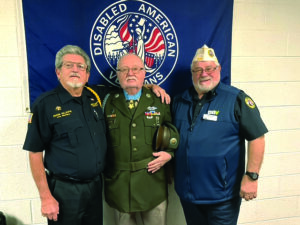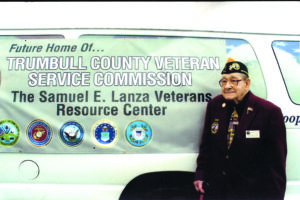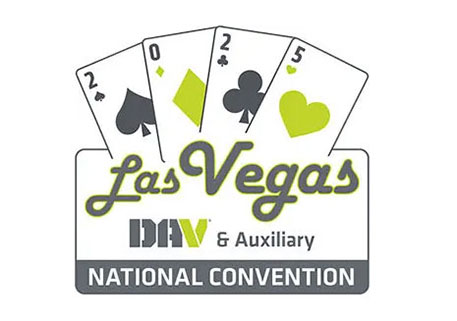 To those who know him, Ken David is as humble and caring as they come. Despite recently receiving the Medal of Honor—the nation’s highest military award for bravery and valor in combat—his continued willingness to serve his fellow veterans hasn’t wavered.
To those who know him, Ken David is as humble and caring as they come. Despite recently receiving the Medal of Honor—the nation’s highest military award for bravery and valor in combat—his continued willingness to serve his fellow veterans hasn’t wavered.
As a determined volunteer and adjutant of DAV Ohio Chapter 11, which has strong ties to its community in Warren, David always sets everything aside to lend a hand to his brothers- and sisters-in-arms. He helps organize and run free dinners for veterans and their families, thanks to donated food from a local restaurant. He’s helped cover the cost of groceries or a meal for veterans who walk into his chapter, to ensure no one goes hungry.
“It just shows the kind of caliber of man he is,” said Sherry Williamson, an administrative assistant with the DAV Department of Ohio, who has known David for over a decade.
David’s courage on the battlefield earned him the Medal of Honor, and now, his continued service to fellow veterans has secured him the title of 2025 Disabled American Veteran of the Year. He has remained a devoted advocate, never letting hardship deter his mission to help others, since returning from Vietnam.
On May 7, 1970, David’s unit came under intense enemy fire. When the platoon leader was killed, David handed off his radio and launched a fierce counterattack. Though vastly outnumbered, he held the line. David also left the safety of the perimeter to protect his wounded comrades.
“Each time the enemy attempted to concentrate its fire on the wounded … David would jump from his position and yell to draw fire away from his injured comrades and back to himself,” his Medal of Honor citation states. “Refusing to withdraw … he continued to engage the enemy.”
“I kept fighting, not knowing I was even wounded,” David said. “The adrenaline was pumping so high, and Sarge kept screaming on the radio for help.”

Through it all, one thought drove him: “I got to help my boys.” Despite being injured by a satchel charge, he continued hurling grenades to protect incoming medevac helicopters. He wasn’t evacuated until the enemy retreated—thanks in large part to his fearless resolve.
Of the 17 men he saved that day, 14 received Purple Hearts, as did he. Although he earned the Medal of Honor in 1970, it would take over half a century to be officially recognized.
After recovering and serving briefly at Fort Dix, New Jersey, he was discharged from the Army and returned home to Warren, where a new battle awaited.
When David returned, he felt isolated. Living with his parents on a dead-end street, he spent much of his time near the creek in the backyard, building a rock wall to create a barrier when it overflowed. David found the running water to be peaceful.
“He pretty much did that on a daily basis just to be by himself,” said Karen Williams, David’s sister. “He had a lot to deal with. When you are at war, and you see your friends and buddies blown up and die right next to you, how can anyone go through something like that and be OK?”
His persistent memories from combat affected his relationships. David instructed his family never to come upstairs to wake him up. When his mother did, he screamed in terror. David was engaged to his high school sweetheart, a carefree 20-year-old. But after Vietnam, he was inclined to detach, often sitting in a corner. The two eventually broke up.
In addition to the mental scars of war and issues reintegrating back into American life, the physical toll of war continued to creep.
“The government took my smile away because, when you live with pain in your back and your knees, it just goes away,” said David.
Williams said he was different, but his warmhearted nature endured. When he found DAV, his whole world changed, benefiting not only David but also fellow veterans in Warren.
“I told myself, whatever I can do to fight to make it easier for the next person behind me, that’s what I’m going to do,” David said.

David met Sam Lanza, a combat-wounded Marine who fought in the Battle of Okinawa in World War II, who quickly got David up to speed on everything about DAV and took him under his wing. Lanza died in 2018, but his legacy remains throughout Warren and Ohio.
“Sam always used this line: ‘A veteran is a veteran is a veteran,’” said Herm Breuer, a member of Chapter 11. “And what he meant by that was, it didn’t matter where they came from, what their upbringing was, what they did wrong or right in life. If they served in the military, then Sam would treat them with the respect they deserved.”
“Ken’s in this patriotic community of Warren, Ohio, and he’s trying to emulate what Sam Lanza taught him,” said DAV Department of Ohio Adjutant Michael Stith. “Sam was his mentor.”
Lanza, who was like a father to David, was instrumental in the advocacy campaign to get David the recognition he’d earned decades ago. He enlisted the help of Breuer, who was a dedicated advocate himself, and gladly picked up the torch for David.
“There’s no reason that the individual responsible for 17 other human beings still alive today isn’t worthy of the nation’s highest medal,” said Breuer.
Then-President Joe Biden bestowed that honor on David last December, following through on Lanza’s, Breuer’s and others’ campaigns and opening up new opportunities for David to share his story.
“He’s the kind of guy who doesn’t say much,” said Williamson. “He’s not boastful, and he would never tell you what he’s gone through for this nation, but now we all know, and others will soon.”
David has now reached national prominence as one of the 61 living Medal of Honor recipients. But to those who call him a friend, he’s just Ken, a dedicated DAV member who is always willing to help.
“I feel that DAV membership, not just in this area but all over the United States, are elated to have one of their members receive the Medal of Honor,” said Jeffrey Wittneben, Department of Ohio commander. “It’s an honor of a lifetime, and Ken certainly deserves it.”






